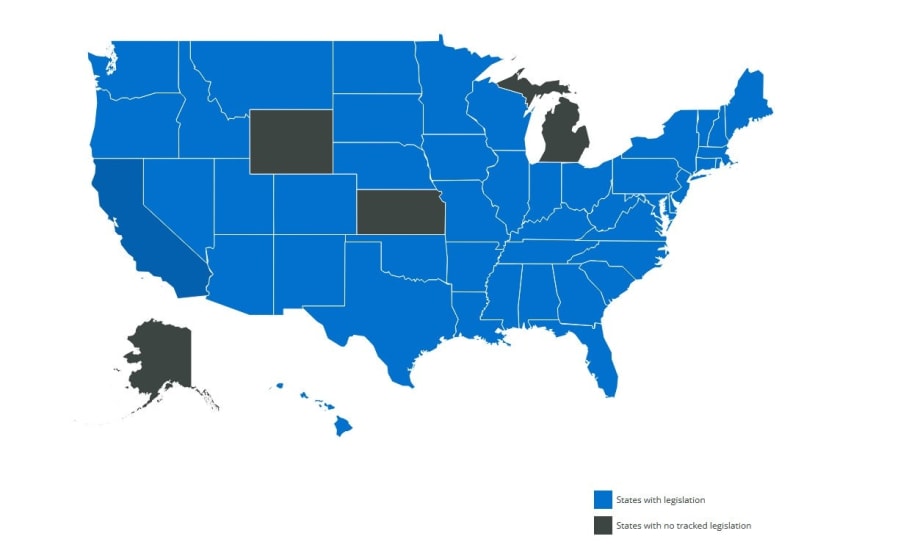Vector Solutions is now offering a free online guide to recently approved law enforcement legislation in each state.
Vector Solutions Offers Free Online Guide to Legislation Affecting Police
The legislative guide focuses on law enforcement concerns such as use of force, training requirements, criminal justice reform initiatives, data transparency, and more.

Users can click on individual states on the Vector Solutions map and learn about recently passed legislation affecting law enforcement.
Vector Solutions
A map-based, user-friendly interface greets officers who visit the online legislative guide. Users can click on any state and see recently enacted laws that concern law enforcement and then drill down deeper to read more about the laws, including a summary and a legislative history.
The legislative guide focuses on law enforcement concerns such as use of force, training requirements, criminal justice reform initiatives, data transparency, and more.
“We developed this tool as a way for agency leaders and training directors to go and get information about what laws have been passed, so they will know what is the expectation, what they need to do, and how they need to change the training,” says Doug Kazensky, a solutions engineer with Vector Solutions and a retired police training coordinator.
Officers could do the research themselves at a variety of state legislative websites, but that would be a time-consuming. And reading and understanding legislation often involves not just reading page after page of dense legalese, it requires a library of previous legislation that the bill is modifying or supplanting.
Kazensky says Vector Solutions’ legislative guide does all the reading and research for you. “We have a specialist on our team, and she spent many months reading all this legislation and summarizing it in plain language,” he explains.
According to Kazensky, larger law enforcement agencies may not have as much need for the legislative guide as smaller ones. “Larger agencies have their own legal departments, training departments, and perhaps a proactive command staff, so they have a better awareness of what their state legislatures are passing and how it will affect them. Smaller agencies and even some larger agencies don’t have those resources. That’s who we had in mind when we were developing this service,” he said.
For major legislation that changes police training requirements or other important agency policies, state law enforcement credentialing organizations such as POST will send alerts to agencies once the legislation passes. Kazensky says the Vector Solutions legislative guide gives officers more information earlier. “This gives you a heads up about what may be coming and what you might have to deal with down the line,” he says.
All of the legislation included in the guide has passed and been signed by the prospective governors, according to Kazensky. There may, however, be a delay in the laws taking effect.
Kazensky says one of the benefits of the Vector Solutions legislative guide is that it allows users to check out laws that will soon take effect in other states. He explains that this can be critically important for agencies near state borders. “I was an officer in the Pacific Northwest—on the Washington-Oregon border—and I wanted to know the legislative trends in states around me because I knew they might be coming to my state,” he says.
Another benefit of the Vector Solutions legislative guide is that it tracks legislation that the press ignores. For example, during 2020 and 2021 in the wake of the George Floyd in-custody death and subsequent protests and riots, a number of state legislatures passed criminal justice reform laws that limited police operations. Those bills were big news at the time. Now, some state legislatures are revising that legislation with new bills that lower some of the restrictions such as Washington state loosening its pursuit law. Stories about the revisions are rarely in the top headlines.
“Despite the best intentions of the legislators, there were unintended consequences,” Kazensky says. “So what we see is that often there’s adjustments in the law. Law enforcement needs to be aware of that so they can also adjust. Let’s say I’ve spent a year training to one standard, then the law changes again. Now I have to train the officers to that new standard because that’s my job as a training coordinator, to make sure my officers have the most up-to-date, accurate information.”
One of the ways agencies can quickly disseminate information on changes in the law that affect law enforcement officers is through the online training platform offered by Vector Solutions. “You can put together a package of updated information and send it to your officers. It could be a PDF, a PowerPoint, a self-produced video, or another format. You can then monitor to make sure everyone viewed it,” Kazensky says.
The new Vector Solutions legislative guide is available on the Vector Solutions website. You do not have to be a Vector Solutions’ customer to use the guide. It is free information. Users can also sign up to have free updates sent to their e-mail inboxes.
More Training

Caswell Live Fire Spins Off from InVeris
Caswell Live Fire has spun off from parent company InVeris, coinciding with the 100th anniversary of Caswell’s founding. Over the past 100 years, Caswell has developed pioneering solutions that support military, law enforcement, and commercial clients worldwide.
Read More →
When Do You Transport a Wounded Officer Instead of Waiting for EMS?
Thumbnail for video series POLICE Topics, Tactics & Tips with a yellow headline that reads When Do You Transport a Wounded Officer Instead of Waiting for EMS?
Read More →
Coffee Break with Police Experts: Using Your Patrol Vehicle for Cover
In this video, hear from Dustin Mowery, a product specialist at Team Wendy, as he discusses how to best use a patrol vehicle for cover.
Read More →
Using Patrol Vehicles for Cover
While a patrol vehicle offers some cover protection when taking fire, remain mobile and don’t stick to one piece of cover indefinitely. Dustin Mowery, of Team Wendy, shares what he teaches about using vehicles as cover.
Read More →
San Francisco Police Recruit Dies in Training
Recruit Officer Jon-Marques Psalms, 30, reportedly suffered a medical emergency after completing a training exercise on Wednesday August 20, 2025, at the Academy.
Read More →
POLICE and Flock Safety Present Webinar on Combining LPR with Real-Time Video
The webinar titled “Beyond the Plate: Real-Time Video Intelligence for Police Operations” will show how pairing LPR data with live camera feeds delivers faster, safer, and more coordinated responses on everything from stolen vehicles to active BOLOs.
Read More →
How to Join a Bicycle Unit
A great bicycle officer has a strong service mentality, paramount knowledge of laws, a thirst for new knowledge, and someone who can adapt to change easily. If this describes you, your agency's bicycle unit might be a good fit.
Read More →
Dave Smith: Be Prepared for the Ultimate Contest
You need to train like an elite athlete for the life-and-death challenge you may some day face on the job.
Read More →
First Look: Adding AI to Simulator Training
The new artificial intelligence feature for MILO’s VR and Focus3D simulators gives trainees a chance to practice and refine their communications skills while working scenarios.
Read More →

